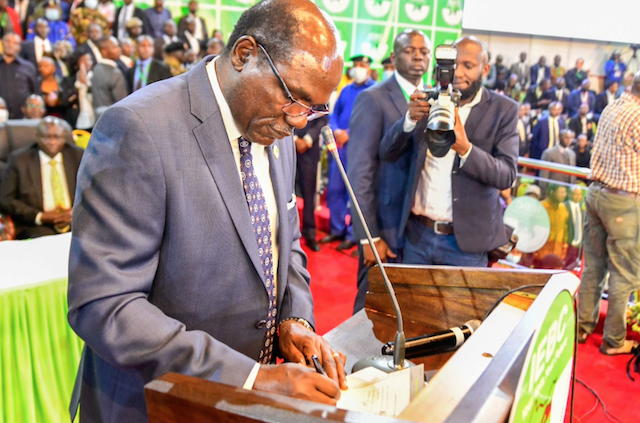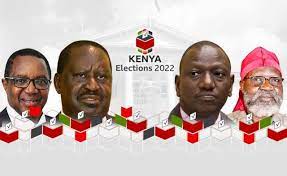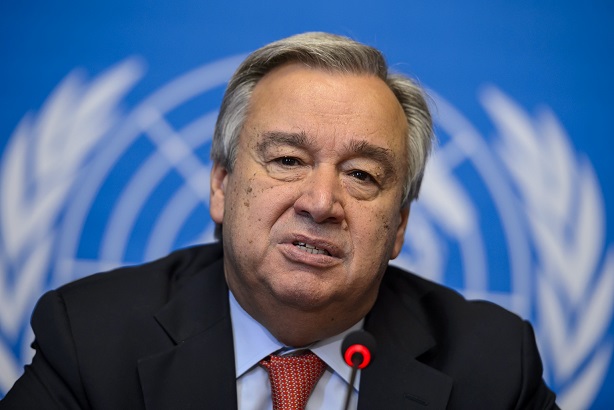It is not always that an election in one part of the world can function as a mirror in another part of the globe. Societies differ in demographics, political and historical evolution, and the general economic issues that shape elections. The general election in Kenya that took place on Tuesday 9th August is in many ways a mirror of the forthcoming 2023 elections in Nigeria. This mirroring is primarily evident in their shared democratic characteristics, current economic climate, and socio-political milieu.
Kenya, resemblant of Nigeria, is a former British colony practising multiparty democracy and is multi-ethnic with three dominant ethnic groups vis Kikuyu, Luhya, and Kalenjin. Kenya, like Nigeria, has a young population, with 75% being under 35years. Nigeria and Kenya in their different constitutional provisions require a candidate to obtain 50% plus one vote to win the presidential race, with 25% spread in 24 of 47 Counties. Like our president Buhari, the incumbent president is not a candidate in this election.
Four significant candidates were Raila Odinga, William Ruto, David Mwaura and George Wajackoya. Two, however, are candidates of the major coalition parties. Like most third-world countries, Kenya faces coordination and network challenges in election management.
The two countries have similar core issues that will define the election. The presidential campaign in Kenya was centred on three issues of economy, corruption, and unemployment. The only difference with Nigeria will be the addition of how to tackle the menace of insecurity bedevilling our country.
In most economic indices, Kenya is better than Nigeria. Kenya’s inflation at 7.9% on election month is better than Nigeria’s 18% by June 2022. Public debt is as high as Nigeria’s, and the unemployment rate is spiralling. On the positive side, Kenya is a regional economic giant in East Africa, while Nigeria is a continental giant. Corruption is endemic and deep-rooted in the private and public sectors. These similarities give us the impetus to pay close attention to the Kenyan elections and learn from the outcome.
Kenyan election brought three fundamental issues for consideration: First, the new increased level of electoral transparency occasioned using technology and the increase in deepening democratic tenets among Africans. Democracy, although young in most African countries, is gradually becoming accepted.
The new school of thought in Africa favours democracy and assumes that only a few bent on circumventing democracy are the culprits of democratic disorder that often leads to electoral violence and crisis. Elections are not only free and fair than in the past, but most are beginning to accept the results of the polls leading to less violence and more acceptance of the electoral outcomes.
Second, it is evident that incumbency is no longer an iron ceiling that is almost impossible to break. Incumbent to non-incumbent transition is a sign of maturity of democracy and is anticipated to happen if the incumbent loses many people’s backings. Anybody or party can lose an election if they lose the political patronage of the people. In the past, votes did not count, and election results were manipulated, written, and imposed on the people by the incumbent party or government.
The third is that Africans are beginning to jettison personality politics and focus more on issues that affect their lives. Insecurity, bad economy, and corruption are quickly becoming the thematic thrust of election campaigns, and the people are getting more likely to vote on their conviction of how candidates will tackle issues plaguing the country than relying on the cult of personality that is more ethnic and religious oriented.
At the end of the Kenyan elections, three patterns have emerged that are instructive to Nigerian politicians, the election management body (INEC) and the electorate. The first pattern is technology’s positive influence on electoral outcomes. Technology deepens electoral transparency, enhances free and fair elections, and reduces rigging. The root of electoral violence in Africa is the lack of trust by stakeholders in the electoral process. Somaliland was the first to use iris recognition for voter accreditation and followed it up with electronic voting. Somaliland went from a war zone to a respected nation in a credible electoral process.
On the other hand, Kenya, which witnessed violence in its 2017 elections, deployed technology to add credibility to the electoral processes. It deepened the application of technology in 2022 using a specially designed Kenya Integrated Electronic Management System (KIEMS), and this reduced the 3-prong evil of violence, rigging and result disputation to its minimum. South Africa and Ghana are other African countries that have taken maximum advantage of technology to deliver free, fair, and credible elections with minimal or no disputation of results.
BVAS, introduced by the electoral commission in Nigeria, like Kenya KIEMS, is an advanced voter identification technology that will be hostile to election riggers, effectively ending the old order. We saw this in recent elections at Anambra, Ekiti and Osun, and nobody challenged the results based on the number in each of those elections. BVAS, according to INEC, promises to deliver elections that reflect the people’s wishes.
The second pattern is that influence of the incumbent on the electoral outcome is beginning to wane. The use of state resources to influence voters will soon be history. Social media and citizens’ vigilance combine to rub government officials of secrecy to deploy state resources at will. Voters who are sure they can cast their votes in secret will vote according to their conscience. Voters are more informed, enlightened, and ready to defend their votes and voices at all costs.
They are more active and less fearful of state apparatus wielding power when deployed to influence elections. It is common knowledge that when incumbents deploy considerable resources to influence voters, many collect the financial inducements and yet vote for candidates most qualified to lead. The third pattern is that the quality of electoral laws and rules are beginning to impact on quality and outcome of elections. We saw this with the electoral reforms in Kenya. The electoral laws and regulations are beginning to provide a level playing field for all parties and voters. Power resides with the people and not local oligarchs somewhere.
Even stakeholders are beginning to buy in on the issue of transparency in elections. It is worthy of note that in the last Kenya elections, the media are becoming unbiased and partisan. For instance, the two leading candidates held simultaneous final rallies in Nairobi, and the police did not interfere. Newspapers, TV, and radios gave balanced and equal coverage to the campaigns. The campaign coverages are a pleasure to watch. To gain support among a disaffected electorate, politicians have had to hinge their campaigns or movement on the country’s pressing economic issues, prompting a shift away from the country’s ethnic and personality-driven politics toward issue-based campaigns.
Tuesday’s polls were peaceful, with isolated violence cases in the northern region. The corrosive ethnic politics that framed previous electoral contests is ebbing . The critical question in the coming days is not only who won the race but whether the loser will accept defeat. This is a sign of maturity of the political players. It is evident from developments in Kenya that the train of history has left Kikuyu hegemony and dynastic politics.
Similarly, Nigeria may witness the end of ethnic politics in 2023. The critical issue in Nigeria, as we saw in Kenya, will be who among the candidates can secure the welfare of the majority. Poverty and hunger have no ethnic colouration. So, hunger and poverty are weaponised to push the electorate to vote for candidates that seem in tune with the economic and corruption realities and usher hope and belief in their future.
Kenya is leading the way in Africa in gender equity in politics and must be emulated by Nigeria and other African countries. According to IFES FAQ on the 2022 Kenyan elections, “Kenya’s legal framework includes firm principles of gender equity. According to the 2010 Constitution, no more than two-thirds of the membership of any elective body in Kenya may be of the same sex. In this respect, the National Assembly reserves forty-seven seats for women and the Senate reserves sixteen for women, with two more Senate seats reserved for women representing youth and persons with disabilities.” Interestingly, three out of the four presidential candidates chose female running mates. Similarly, the country believes in the twinning principle.
Another exemplary provision in Kenyan electoral law is the out-of-country voting provision. According to IEBC, out-of-country voting is allowed for the presidential election only.
Kenyan voters outside the country may only vote from twelve countries, chosen based on the number of Kenyans who live there. These voting took place in Tanzania, Uganda, Rwanda, Burundi, South Africa, South Sudan, Germany, United Kingdom, Qatar, United Arab Emirates, Canada, and the US.
It is quite unfortunate that despite the enormous contributions of Nigerians in Diaspora to the country’s economy and image laundry, they have no say in determining the political leadership of their homeland except they take the cumbersome option of travelling down to Nigeria to register and later to vote.
Finally, It can only be hoped that free and fair elections are not seen as ends in themselves. Instead, free and fair elections should produce governments that can end illiteracy, poverty, unemployment and limited enlightenment.
Only by so doing can democracy improve and entrench itself to become an integral part of the value and cultural reality of tomorrow’s Africa.
All eyes are now on Angola (August 2022), Chad (September 2022), Lesotho (Oct 2022), Somaliland (Nov 2022), Sudan (December 2022) and Nigeria (Feb 2023) to deliver free, fair, and credible elections, deepen democracy, promote political transformation, increase prosperity and give Africa hope of a bright future. Nigeria must show leadership and use the 2023 election to highlight democratic resilience and deep-rooted principles in the Nigerian democratic culture.








![[VIDEO] Woman grabs presidential candidate’s manhood during campaign](https://thenewsguru.ng/wp-content/uploads/2022/07/manhood.jpg)